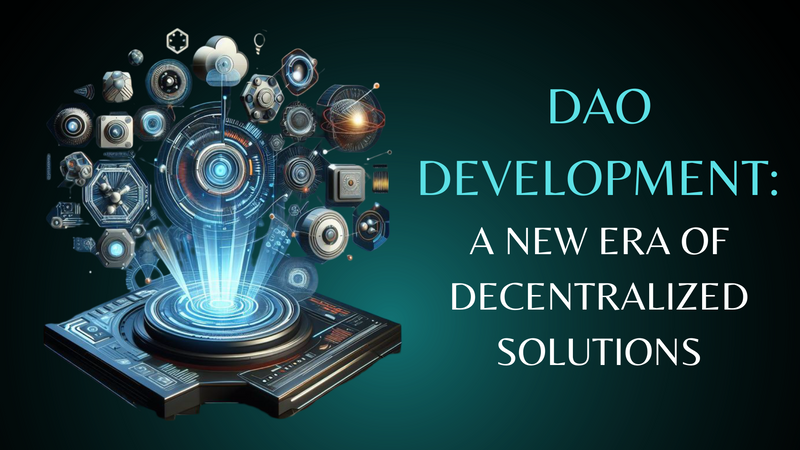Decentralized Autonomous Organizations (DAOs) are becoming a disruptive force in the quickly developing field of blockchain technology, changing the way businesses, communities, and protocols function. With DAOs, centralized governance frameworks give way to decentralized, code-driven ecosystems where stakeholders actually wield power.
What is a DAO?
Smart contracts on the blockchain combine with their community members to govern decentralized autonomous organizations rather than traditional governing bodies. Smart contracts contain organizational processes which let autonomous operations function with complete transparency. Participants in DAOs cast their votes using governance tokens to determine choices regarding spending budgets as well as enhancing features and accessing partnerships.
A trustless ecosystem emerges using transparency and consensus instead of traditional organizational hierarchies. Across finance, platform, community and protocol settings DAOs demonstrate their ability to function as diverse yet sustainable governance frameworks.
The Rise of DAO Development
The development of DAOs expanded extensively as Web3 evolved to become a full-blown market sector utilizing various tools and platforms along with frameworks. The launch and operational management of DAOs now become accessible for non-technical users via platforms such as Aragon and DAOstack and Snapshot.
Key components of DAO development include:
Smart Contract Infrastructure: The system provides fully automated functionality for rules enforcement alongside voting procedures and treasury financial control.
Governance Mechanisms: Democratic participation is made possible through voting systems which include 1-token-1-vote and quadratic voting.
Treasury Management: Shared funds are securely managed through on-chain treasuries and Multisig wallets.
Community Tools: DAOs use platforms such as Discord, Discourse, and Snapshot to enhance community organization and communication.
Why DAOs Matter
Decentralization: A DAO achieves resilience by sharing power across all its members. Their distributed nature makes DAOs stronger against potentially corrupting elements that could lead to censorship or control.
Transparency: The entire operational history of a DAO gets stored on-chain which provides complete transparency to its members about their proposals and voting results alongside fund management.
Global Collaboration: DAOs enable borderless coordination. Through an internet connection anyone can both contribute to DAO initiatives and propose them or vote on them which results in inclusive innovation.
Programmable Governance: Smart contracts in DAOs automate tasks to decrease both administrative costs and enforcement expenses by embedding the rules into their programs.
Use Cases of DAOs
DAOs are already disrupting multiple sectors:
DeFi Protocol Governance: The governance platforms of DeFi protocols Uniswap and Aave empower token holders to determine how both fees and upgrades should proceed.
Investment DAOs: Through The LAO and Syndicate members contribute their pooled resources together to invest in startups and NFT collections.
Grant DAOs: Through its voting system Gitcoin DAO enables its community to distribute funding toward open-source software and public goods projects.
Social and Creator DAOs: Social and economic communities under the title Friends With Benefits (FWB) alongside additional decentralized autonomous organizations unite individuals through shared interests to provide distinct advantages for their members.
Challenges and the Road Ahead
Although DAOs have a lot of promise, there are several challenges:
Legal Uncertainty: A dearth of comprehensive regulatory systems regarding DAOs continues to exist throughout numerous jurisdictions which results in compliance and legal uncertainties.
Security Vulnerabilities: Poor smart contract quality remains a significant security risk since it led to the renowned 2016 DAO hack.
Governance Fatigue: The involvement of voters is vital for proper decision processes yet tends to decrease when large DAOs demand action.
Even with these obstacles DAO development continues to evolve. DAO-like models will become more appealing to traditional organizations due to better tools combined with increased legal clarity.
Touch Crypto’s Role in DAO Innovation
The Web3 infrastructure leader Touch Crypto stands among the initial companies developing DAO infrastructure. Touch Crypto focuses on developing interoperable secure and scalable DAO frameworks by leveraging its existing expertise in cross-chain bridges RWA tokenization and GameFi systems. Through its platform Touch Crypto provides easy access for communities and enterprises to create decentralized governance systems for DeFi protocols tokenized asset management and gaming ecosystems. Touch Crypto provides users with tools that enable them to adopt decentralized autonomous organization-based governance of their ecosystems while maintaining sustainability alongside transparency and collective ownership.
Conclusion
Decentralization, openness, and community ownership will reinvent how we work together in the new era of organizational architecture that DAO development heralds. DAOs have evolved from theoretical ideas to useful instruments for governance in the real world, with pioneers like Touch Crypto spearheading the movement as a reputable DAO Development Company. A more open, equitable, and decentralized digital economy is expected to be built on DAOs as adoption speeds up and technology continues to change.



Top comments (0)